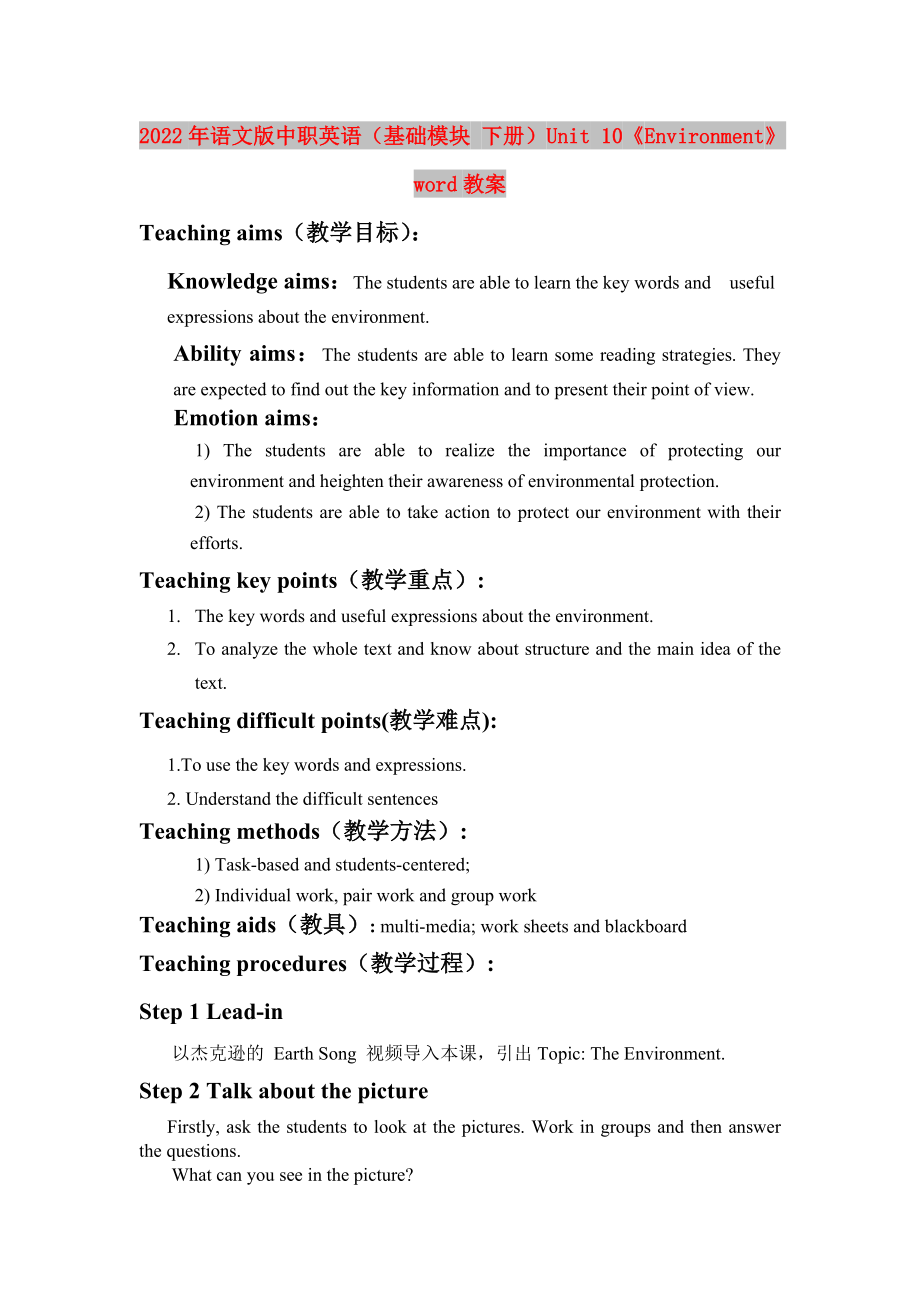《2022年語(yǔ)文版中職英語(yǔ)(基礎(chǔ)模塊 下冊(cè))Unit 10《Environment》word教案》由會(huì)員分享,可在線(xiàn)閱讀�,更多相關(guān)《2022年語(yǔ)文版中職英語(yǔ)(基礎(chǔ)模塊 下冊(cè))Unit 10《Environment》word教案(3頁(yè)珍藏版)》請(qǐng)?jiān)谘b配圖網(wǎng)上搜索。
1���、2022年語(yǔ)文版中職英語(yǔ)(基礎(chǔ)模塊 下冊(cè))Unit 10《Environment》word教案
Teaching aims(教學(xué)目標(biāo)):
Knowledge aims:The students are able to learn the key words and useful
expressions about the environment.
Ability aims:The students are able to learn some reading strategies. They are expected to find out the key information a
2�、nd to present their point of view.
Emotion aims:
1) The students are able to realize the importance of protecting our environment and heighten their awareness of environmental protection.
2) The students are able to take action to protect our environment with their efforts.
Teaching key point
3����、s(教學(xué)重點(diǎn)):
1. The key words and useful expressions about the environment.
2. To analyze the whole text and know about structure and the main idea of the text.
Teaching difficult points(教學(xué)難點(diǎn)):
1.To use the key words and expressions.
2. Understand the difficult sentences
Teaching methods(教學(xué)方法)
4�����、:
1) Task-based and students-centered;
2) Individual work, pair work and group work
Teaching aids(教具): multi-media; work sheets and blackboard
Teaching procedures(教學(xué)過(guò)程):
Step 1 Lead-in
以杰克遜的 Earth Song 視頻導(dǎo)入本課�,引出Topic: The Environment.
Step 2 Talk about the picture
Firstly, ask the students
5��、to look at the pictures. Work in groups and then answer the questions.
What can you see in the picture?
What is the problem does the picture want to show us?
1. Piles of rubbish are everywhere. Rubbish pollution
2. Heavy smoke is ing out of the chimney. Air pollution
3. Polluted water kills
6����、 the fish. Water pollution
4. Noise is ing out of the plane. Noise pollution
Secondly, lead the students to review the key words and useful expressions in this unit.
Step 3 Reading (閱讀)
At the beginning, explain some reading strategies to the students.
Task1. Fast reading. (10mins)
Ask
7、 the ss to read the text as fast as they can. They should read it silently. Then answer the following questions:( 方法引導(dǎo):略讀或?yàn)g覽閱讀���,忽略不懂的句子和生詞����,快速閱讀課文����。目的只是為了了解閱讀材料的內(nèi)容大意,不求甚解����。題目的作用不可忽略。)
1. What makes it hard for people to breathe the fresh air?
2. What now harms everyone in the world?
3. What is coal u
8��、sed for?
4. What causes traffic jams everywhere in large cities?
5. How many people a year die of diseases related to air pollution in the United States according to the Natural Resources Defense Council?
6. Is the death rate of diseases related to air pollution higher than that of traffic accide
9、nts or AIDS?
7. What would help to protect and to improve the environment?
Ask the represent in each group to give the answer.
Task2. Careful reading. (15mins)
Ask the ss to read the text again. This time they should read as loudly as they can and find out the main idea of each paragraph. Then
10�����、finish the exercises below. (進(jìn)一步有目的的閱讀�,可以更好的理解文章細(xì)節(jié))
Task 1. True or false. (判斷正誤(T or F))
1. People in large cities feel that the sky is as blue as it used to be. ( )
2. There is more fresh air for people to breathe. ( )
Task 2. Filling the gap according to the text..(根據(jù)課文內(nèi)容填空)
1. Air pol
11����、lution now _______ everyone in the world.
2. Coal is used in ______ and also for _______and ______.
3. Smoke from ___________ is one of the causes of air pollution.
4. According to the Natural Resources Defense Council in the United States, about 50,000 people a year _______ diseases _________ai
12、r pollution.
5. The unreasonable production often ________, water pollution and much ______ to the environment.
6. Not only the government _________ we the citizens should work more actively to _________ pollution and to ______ the environment. In addition, we should also __________our own actions
13�����、.
Task 3. Explaining main and difficult points(釋疑)
Let the students work in groups and find out the difficult points, then tell the teacher.(在限定時(shí)間內(nèi)劃出疑難問(wèn)題�����,在組內(nèi)討論�����,互相啟發(fā)��,教師巡查�����,給學(xué)生提供及時(shí)幫助,然后小組向全班陳述本組難題�,教師根據(jù)各組信息反饋,通過(guò)典型例句精講重難點(diǎn)����,培養(yǎng)學(xué)生獨(dú)立思考問(wèn)題、解決問(wèn)題的能力和合作探究精神���。)
1. People in large cities feel that the sky is no lo
14����、nger as blue as it used to be.
2.There is less fresh air for people to breathe.
3.Even the beautiful little birds flying in the sky are dressed in black and grey.
4.The serous problem is that too many cars are running in the street.
5.At the same time, the excessive waste gases which are given
15�����、out by cars badly damage the air quality.
6. Little things like reusing, not littering around and walking or biking instead of driving cars would help to protect and to improve the environment.
Step 4 Retelling. (復(fù)述課文)(15mins)
Ask the ss to work in groups and retell the last paragraph . Then ask
16��、the represent of each group to present in front of the class. The following sentences and words can give them some enlightenment.
Not only…but also…should… to fight against…and to protect….
In addition, we should also be aware of …..
Little things like…….instead of….
We hope that….
(復(fù)述文章有助于培養(yǎng)學(xué)生語(yǔ)言運(yùn)用能力)
Step 5 Summary (總結(jié))
1. T:What have you learned from this class? What should you do?
2. Main points(略)
Step 6 Homework.(作業(yè))
Writing: What should we do to protect the environment? (100 words)
 2022年語(yǔ)文版中職英語(yǔ)(基礎(chǔ)模塊 下冊(cè))Unit 10《Environment》word教案
2022年語(yǔ)文版中職英語(yǔ)(基礎(chǔ)模塊 下冊(cè))Unit 10《Environment》word教案

